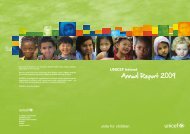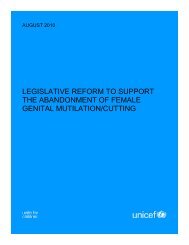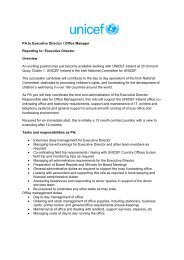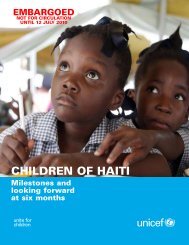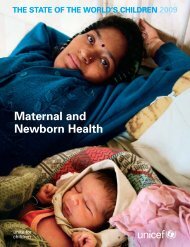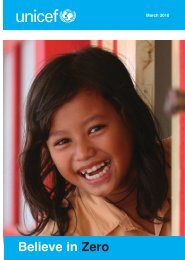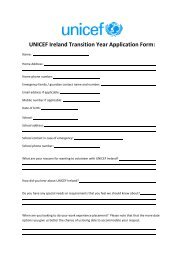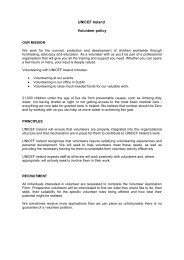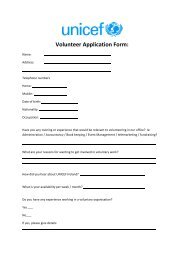Humanitarian Action for Children 2011 - Unicef
Humanitarian Action for Children 2011 - Unicef
Humanitarian Action for Children 2011 - Unicef
- No tags were found...
You also want an ePaper? Increase the reach of your titles
YUMPU automatically turns print PDFs into web optimized ePapers that Google loves.
Middle East and North Africa<strong>Children</strong> and women in crisis<strong>Humanitarian</strong>funding at work:Highlights from 2010In 2010, UNICEF estimatedthat US$5 million was required<strong>for</strong> humanitarian activitiesin the Middle East and NorthAfrica, including US$4 million<strong>for</strong> drought relief in Djibouti.As of October 2010, a totalof US$3,321,603, or 66 percent of the goal, had beenreceived. In Djibouti, UNICEFwas able to assist a largenumber of children in needof nutritional support, repairdrinking-water sources andincrease availability of hygienesupplies (see Djibouti chapter).During conflict-related crises inIraq, the Occupied PalestinianTerritory, the Sudan andYemen, the regional officedispatched emergency andtechnical support staff. Inaddition, UNICEF strengthenedpartnerships at the regionaland global levels by workingclosely with the inter-agencyregional emergency networkon preparedness and response.Ef<strong>for</strong>ts to improve overalldisaster preparedness moved<strong>for</strong>ward when the regionalteam drafted a disaster riskreduction strategy focusing oneducation and WASH.The Middle East and North Africa region is marked by long-termpolitical instability in Iraq, the Occupied Palestinian Territory, the Sudanand Yemen. The number of internally displaced people in the region isestimated in the millions, and many women and children lack access toessential services and protection systems. Natural disasters are also agrowing concern as climate change, combined with increases in rapidurbanization, resource depletion and the degradation of the environmentis resulting in more frequent disasters. During the past 19 years,approximately 100 million people in the region have felt the impact ofthese hazards, resulting in damage of around US$39 billion, 1 furtherchallenging the economic stability of millions of vulnerable people.Meeting urgent needs and building resilience in <strong>2011</strong>A primary goal <strong>for</strong> UNICEF in the Middle East and North Africa region in <strong>2011</strong> is strengtheningdisaster preparedness by helping country offices through technical assistance and resourcemobilization. The regional office will continue to provide technical assistance to countries usingthe inter-agency cluster coordination mechanism to meet UNICEF’s commitments as clusterlead in the areas of WASH; nutrition; education; and child protection.• Emergencies in the region are becoming more complex and require increasingly targeted yetnuanced advocacy. In <strong>2011</strong>, the regional team will continue to strengthen ties to governmentpartners and to advocate <strong>for</strong> awareness of sensitive issues and the effects of emergencieson children.• UNICEF will establish a subregional standby capacity, likely to be located in Jordan andeasily accessible by road, to cover the immediate emergency supply needs of 50,000 peoplein Iraq, Jordan, Lebanon, the Occupied Palestinian Territory and the Syrian Arab Republic.• The regional office will provide technical support to ensure that at least 80 per cent of UNICEFcountry offices in the region have active and operational emergency preparedness andresponse plans.• In anticipation of a potential humanitarian crisis in the Sudan, country offices will continueto receive support in preparedness planning, including preparation <strong>for</strong> an enhanced regionalresponse <strong>for</strong> children and women within and outside the Sudan.• Disaster risk reduction practices will be integrated into regional and national educationpolicies and plans. Strategies to achieve greater safety and resilience at the local level will betaught in schools and through public awareness campaigns.• The regional office will provide support to the Algeria Country Office in its ef<strong>for</strong>ts to addressthe vulnerabilities of Sahrawi refugees living in Tindouf.1. The WHO Collaborating Centre <strong>for</strong> Research on the Epidemiology of Disasters (CRED) emergency events database(EM-DAT).46 <strong>2011</strong> UNICEF <strong>Humanitarian</strong> <strong>Action</strong> FOR CHILDREN | www.unicef.org/hac<strong>2011</strong>




